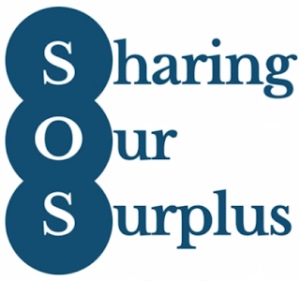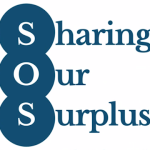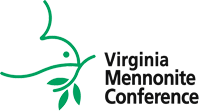
Sharing our Surplus
by Harvey Yoder
SOS Committee
 In early 2017 some of us proposed setting up a special giving table at the Virginia Mennonite Relief Sale as a way of adding to the total revenue generated for Mennonite Central Committee through this fall auction and craft and food sales. With the approval of the Sale’s executive committee a Sharing Our Surplus (SOS) group was formed to give this a try, hoping we could raise at least $10,000.
In early 2017 some of us proposed setting up a special giving table at the Virginia Mennonite Relief Sale as a way of adding to the total revenue generated for Mennonite Central Committee through this fall auction and craft and food sales. With the approval of the Sale’s executive committee a Sharing Our Surplus (SOS) group was formed to give this a try, hoping we could raise at least $10,000.
Prior to this the Relief Sale had already been raising some cash contributions by occasionally calling on bidders during the auction to make monetary gifts. In addition there has long been the My Coins Count campaign (formerly Penny Power) which raises from between $20,000 to $30,000 in the months prior to each fall’s event.
The additional SOS giving at the Sale has been gratifying, though modest in scale. And there’s no way of knowing how many of the donors who gave at the Sale would have contributed to MCC at other times and by other means.
Here are the numbers:
2018 $31,508
2019 $27,803
2020 $47,406
2021 $50,710
2022 $37,396
Some have raised questions about how the word “surplus” might be understood by the average Sale attendee as simply asking for crumbs and leftovers from our wealth-laden tables. As a result we have seriously considered whether we should rebrand this effort and come up with a different logo.
But a dictionary definition of the word surplus is simply “the amount that is more than what is required or necessary.”
Hmm.
Given the Biblical teaching that “the earth is the Lord’s,” and that God’s children are simply stewards and managers of God’s wealth, how much of the “Company of Heaven’s” money should we managers budget for our own living expenses and how much should be invested in the needs of others in the family of God? If we truly saw things from our Creator’s perspective, one concerned about the wellbeing of all creation, how might we determine what is “required” or “necessary”?
One measure might be whether our spending and consuming would resemble what would be possible for our other “neighbors” on the planet. At the very least, loving them as ourselves should mean wanting to see that each of them, each refugee, each victim of war or famine, every man, woman and child on earth, be afforded their daily bread, their fair share of God’s manna, along with medical, shelter, clothing, transportation and other “required and necessary” amenities.
When Jesus asked the rich young ruler to sell his possessions and share them with the poor, I don’t believe he meant to deprive him and his family of their actual necessities. I’m not even sure he was asking him to divest himself of his capital wealth, that is the land or business enterprise the man managed as a means of production. Some of his own disciples, for example, were a part of their family’s fishing business, with its inventory of boats, nets and other fishing equipment.
But in Matthew and Mark’s gospel, Jesus clearly asks the young man to sell off his surplus, to rid himself of his excessive consumer wealth and share the proceeds with those in need. This sounds like the very thing he would counsel wealthy North Americans to do as well.
The gospel of Luke does insert the word all in the account, as in “Sell all that you own, and distribute the money to the poor, and you will have treasure in heaven.”
In any case, being offered stock in the Company of Heaven through investing in the needs of the poor is surely the best financial counsel we could ever get.
Harvey Yoder, SOS Committee
